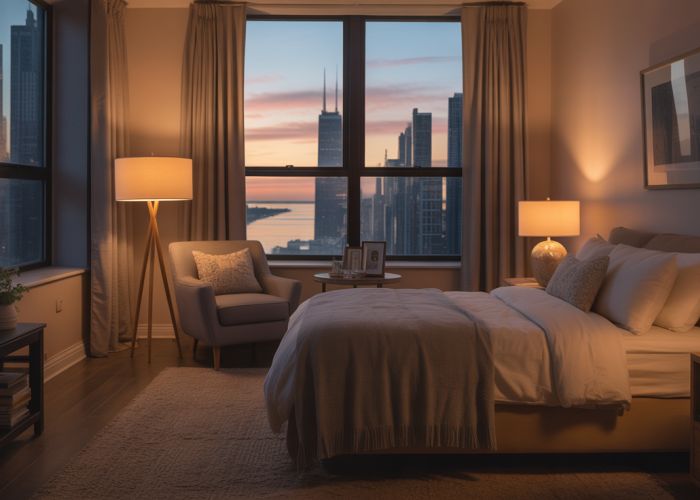Chicago noise ordinances significantly impact residents’ quality of life within city limits. The City of Chicago enforces regulations designed to maintain peace, particularly regarding chicago quiet hours. Understanding apartment living etiquette is crucial, as inconsiderate noise levels can lead to conflicts. Furthermore, knowledge of how to file a noise complaint ensures residents can address disturbances appropriately, helping to uphold community standards regarding chicago quiet hours.

Understanding Chicago Quiet Hours: A Resident’s Guide
This guide provides a clear overview of "chicago quiet hours" and how they impact residents. We’ll cover the rules, how to report violations, and offer practical tips for maintaining peace and quiet in your neighborhood.
What are Chicago Quiet Hours?
Chicago does not have explicitly defined city-wide "quiet hours" in the way some other cities do. Instead, Chicago focuses on noise ordinances that are in effect at all times, but are generally enforced more strictly during specific nighttime hours. These ordinances aim to limit excessive noise that could disturb residents.
- The key is understanding and abiding by the general noise regulations.
- While there aren’t set "quiet hours," the period from 10:00 PM to 7:00 AM is when noise complaints are most likely to be taken seriously.
- Think of it less as a strict curfew on sound and more as a guideline for considerate behavior.
Key Noise Ordinances to Know
Chicago’s noise ordinances cover a range of potential disturbances. Understanding these will help you stay compliant and avoid potential fines.
Loud Music and Amplified Sound
- General Rule: Avoid excessively loud music or amplified sound that can be heard from a distance, especially during the night.
- Consideration for Neighbors: Be mindful of volume levels, particularly in densely populated areas.
- Permitted Events: Larger events often require permits that may include stipulations about noise levels and hours of operation. Check with the city.
Construction Noise
- Permitted Hours: Construction noise is generally permitted during weekdays, usually from 7:00 AM to 8:00 PM. Specific hours may vary depending on the type of construction and location.
- Weekend Restrictions: Construction noise may be limited or prohibited on weekends and holidays.
- Exceptions: Emergency repairs or essential infrastructure work may be exempt from these restrictions.
Vehicle Noise
- Muffler Requirements: All vehicles must have working mufflers to minimize noise.
- Loud Car Stereos: Excessive car stereo volume is prohibited, particularly late at night.
- Idling: Excessive vehicle idling is also regulated and can result in fines.
Reporting Noise Violations
If you are experiencing excessive noise that violates Chicago’s ordinances, here’s how to report it:
-
Non-Emergency Number: Call the Chicago Police Department’s non-emergency number: 311.
-
Provide Details: Be prepared to provide the following information:
- The address where the noise is originating.
- A description of the noise.
- The time the noise started.
- Your contact information (optional, but it can help with follow-up).
-
Documentation (Optional): If possible, document the noise with audio or video recordings. This can be helpful as evidence.
-
Follow-up: If the noise persists, consider following up with 311 to check on the status of your complaint.
Tips for Maintaining Peace and Quiet
Being a good neighbor is essential in a densely populated city like Chicago. Here are some practical tips:
- Communicate with Neighbors: If you are planning a party or event that might generate noise, let your neighbors know in advance.
- Use Headphones: Use headphones when listening to music or watching movies late at night.
- Consider Soundproofing: If you live in an apartment or condo, consider soundproofing measures like thick curtains or rugs.
- Be Mindful of Foot Traffic: Avoid stomping or heavy walking, especially on upper floors.
- Respect Building Rules: If you live in an apartment building, be sure to adhere to any specific noise regulations outlined in your lease or building rules.
Chicago Noise Ordinance Exemptions
While the city aims to minimize noise, some activities are exempt from the usual restrictions. Understanding these exemptions can help avoid unnecessary conflicts:
| Exemption Category | Description |
|---|---|
| Emergency Vehicles | Sirens and other noises from emergency vehicles (police, fire, ambulance). |
| Public Events | Concerts, festivals, and other permitted public gatherings may have temporary exemptions. |
| City Maintenance | Necessary work performed by city crews (e.g., street cleaning, snow removal). |
| Railroad Operations | Noise generated by trains and railroad operations. |
| Aircraft Noise | Noise from airplanes taking off and landing at airports. |
It is important to note that these exemptions do not provide a complete free pass. Authorities still have the discretion to address excessive noise, even from exempt sources, if it is deemed unreasonably disruptive.
Chicago Quiet Hours: Your Questions Answered
Here are some frequently asked questions about Chicago’s quiet hours to help you maintain peace and quiet in your neighborhood.
What exactly are Chicago quiet hours?
Chicago quiet hours are designated times when noise levels are expected to be kept to a minimum. This is to ensure residents can sleep and enjoy their homes without excessive noise disturbances.
When are Chicago quiet hours in effect?
Generally, chicago quiet hours are from 10:00 PM to 8:00 AM every day. Keep in mind that some areas or buildings may have different rules.
What happens if I violate Chicago quiet hours?
Violating chicago quiet hours can result in warnings and, in some cases, fines. It’s best to be considerate of your neighbors and keep noise levels down during these times.
What types of noise are considered violations of Chicago quiet hours?
Excessive noise from parties, loud music, construction, and amplified sounds are typically considered violations during chicago quiet hours. Use common sense and be mindful of the noise you are creating.
So, that’s the lowdown on Chicago quiet hours! Hopefully, you’re now better equipped to navigate the noise rules and enjoy a little more peace and quiet. Stay neighborly!